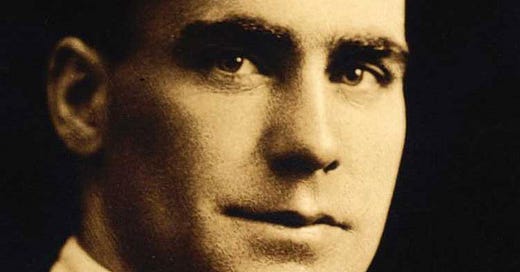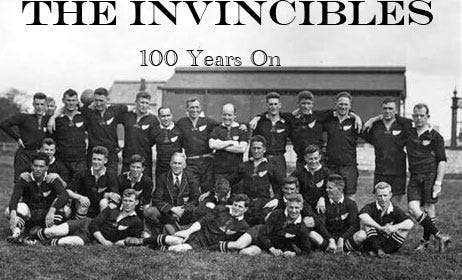Cliff Porter lived without an explanation for why he was appointed captain of the Invincibles for their 1924-25 tour of Britain, Ireland, France, and Canada.
After the team returned from Australia, and the night before they embarked on their voyage to England, he learned he would replace first five-eighths Ces Badeley, who captained them on their Australian tour.
Cliff Porter - last-minute choice as All Blacks captain for 1924-25 tour. (Archives New Zealand Reference: ACGO 8333 IA1 1349 15/11/17721)
Porter, who had only made his All Blacks debut a year earlier, said he was surprised at his choice and the circumstances of his being told.
We were having a farewell dinner in the evening. We were sailing at 2pm the next day and an extraordinary thing happened. I was called up to the room where the Rugby Union was meeting and finalising things. I was called in about half past 10 or a quarter to 11 and they invited me to take the position of captain of the team.
I said 'No I don't want to be captain, what's wrong with Badeley?' and they said, 'No, we want you to take it.' I turned them down a couple of times. I turned them down and put a stop to it by going home that night about midnight.
Dear old Maida [his mother] was packing my bags and I told her I was captain. She said, 'I feel very sorry for you my boy'. What a shock I got next morning - the phone was going, there was telegrams coming in and we were busy getting ready for our long trip to England.[1]
Porter was surprised after the team's midnight arrival in Auckland from their Australian tour and wondered why he wasn't selected to play against Auckland later that day.
It was extraordinary, I was fit as a fiddle and they wouldn't pick me to play, they never explained why.[2]
The answer most likely came that night in Wellington, as they didn't want Porter injured ahead of the tour.
After playing Manawatu-Horowhenua, the team returned to Wellington for final British and Irish tour preparations.
Before leaving, the team met at the Grand Hotel in the morning, and Porter was besieged with congratulations for his appointment but said it wasn't especially enjoyable.
I was very thrilled in a way, but I could never understand why they dropped Badeley.[3]
After the ship pulled away from the Wellington wharf and the players settled down after all the farewell activities, Porter could afford to sit back and reflect on how much had happened to change his life in the previous 12 months.
One of his teammates, Bert Cooke, had no concerns about his appointment as skipper.
Badeley had been appointed captain for the Australian tour, but Cliff Porter was appointed later for the English tour. As far as I know, there was no mystery about this, and there was no question of any lack of confidence in Badeley. It was simply that Porter was playing exceedingly well, and showed himself to be an astute tactician. Also, he showed later when he stood down from international matches in Britain that in addition to being a good player, he was prepared to put the welfare of his side above personal ambition.[4]
Porter was the only British-born member of the side. He was born in Scotland on May 5, 1899, along with his twin, Herbert. The family emigrated to New Zealand early enough for him to play his first football at South Wellington School and for the Wellington College 1st XV in 1915, his only year at high school.
He played senior rugby for the Old Boys Club during the First World War when the grade was confined to players under 20 years. That rule also applied to representative games. He played for Wellington in 1917 as a first five-eighths in wins over Wairarapa (39-3) and Auckland (21-11) in Wellington and a loss in a return game in Auckland (12-20). The age limits continued in 1918, in which he played four games, three of them on the wing, and one at centre.
He had a four-year stint in Horowhenua from 1918 to 1921 while doing a cadetship on a sheep farm. Upon his return in 1922, he attended the Wellington College Old Boys' Rugby Club's annual meeting and claimed no one was interested in him. However, Arthur Carman said he played several senior games for Old Boys at first first-eighths. But, Porter told Wallie Ingram that at the end of the 1922 season, he decided to opt out of playing rugby. That proved a short-lived notion. In 1923, while working in his father's grocery shop, rugby identity Harold Murphy walked in, saw him and asked when he would be playing again.
Porter replied that he had been offered games with Poneke and Petone but didn't feel like playing again. It might have stayed that way had Murphy not said if he came to training at the Athletic club, he would make sure three men he had learned Porter revered, Arthur 'Ranji' Wilson, Alec Bruce and Teddy Roberts would be there. Having gone along and met them, Porter learned the three had decided he should be asked to play for Athletic and to captain their senior team.
That's how I joined Athletic. I went along to meet my idols and the next thing I knew I was leading the team onto the field as captain over my idols! What great men they were and how they helped me.[5]
But that wasn't the end of things.
Having started with Athletic as a five-eighths, he played below par and was dropped for several games. Arthur Carman later said Porter's first game as a wing-forward occurred one week when the club had a vacancy in the position.[6]
The newspapers gave me a great write-up after the [club] game, so maybe I had played well after all. I regained my faith in myself and, from that game, never looked back.[7]
Although, as Porter told the story to Ingram when he was left out of the backline on one occasion, one of Porter's fellow selectors, Paddy Murphy, noticed Porter wasn't in the team. Murphy said he should play wing-forward. Whichever version is correct, Porter didn't think he had done well by halftime of his first game in the position, but the players told him otherwise.
Having proved an immediate success, he debuted for Wellington on July 25, 1923, against Southland in a 30-18 win; the rest was history. The New Zealand Times said Porter was instrumental in turning around a poor effort by the Wellington backs.
Porter, however, atoned for this weakness very largely by working with the backs, and was a continual thorn in the side of the Southland rearguard.[8]
Wing-forward proved a comfortable fit. He was rated the best forward on the field in Wellington's next game, a Ranfurly Shield challenge against Hawke's Bay, which saw the holders retain the trophy 10-6. More games followed after Wellington beat the touring New South Wales side 29-16, with Porter again outstanding. He was named an All Black to play the third 'Test' against New South Wales in Wellington when incumbent Moke Belliss was injured. The 38-11 win ensured Porter would be a contender for the tour to Britain, Ireland and France the following year.
In the Wanganui regional All Blacks' trial in 1924, Porter enhanced his chances of touring by outplaying Belliss and being selected to captain the North Island in the inter-island game. The North won 39-8. Porter and his opponent in that contest, Jim Parker, were among the first 16 named by the national selectors to make the touring team.
On the short tour to Australia, Porter played in each of the 'Tests' against New South Wales. His wing-forward play style proved different from what the Australians were used to experiencing.
Porter, the New Zealand wing-forward, proved himself a great player, and adapting his play to the referee's rulings, he distinguished himself as being the only New Zealand player in this position, who has come to this country, and not incurred the wrath of the crowd by illegal tactics.[9]
After the final game, an unidentified Sydney writer said Porter had made the most of his roving commission.
Wherever there was work to be done, he was there to do it. It was indeed fitting that he should score two tries, and it so happened that they were mainly due to his own resourcefulness, his own enterprise, and his anticipation of the tactics that were to be employed by his opponents. Sydney is likely to talk of this great winger for some time to come.[10]
Porter's appointment to the All Blacks' leadership for the British, Irish, French and Canadian tour was all the more intriguing as he was given the job ahead of 'Jock' Richardson, who had led the All Blacks a year earlier against New South Wales.
However, circumstances, including an injury before the first Test against Ireland and the great form of fellow wing-forward Jim Parker, meant Porter's only Test played was against France. His leadership role will be discussed in a later article in this series.
NEXT ISSUE: Preparations afloat.
[1] Cliff Porter, interviewed by Ian Stevenson, a Canadian rugby enthusiast who toured New Zealand in the 1970s interviewing members of the 1924-25 Invincibles. His recordings are held by the NZ Rugby Museum.
[2] Porter ibid
[3] Porter ibid
[4] Bert Cooke, New Zealand Observer, 6 August 1936
[5] Cliff Porter, interviewed by W.F. 'Wally" Ingram, Legends in their Lifetime, Whitcombe and Tombs, Wellington, 1962
[6] Arthur Carman, profile of Cliff Porter, Daily Telegraph, Napier, 22 September 1927
[7] ibid
[8] New Zealand Times, 26 July 1923
[9] W.M.R. The Sun, Sydney, 6 July 1924
[10] Unidentified Sydney writer, quoted by Arthur Carman ibid




